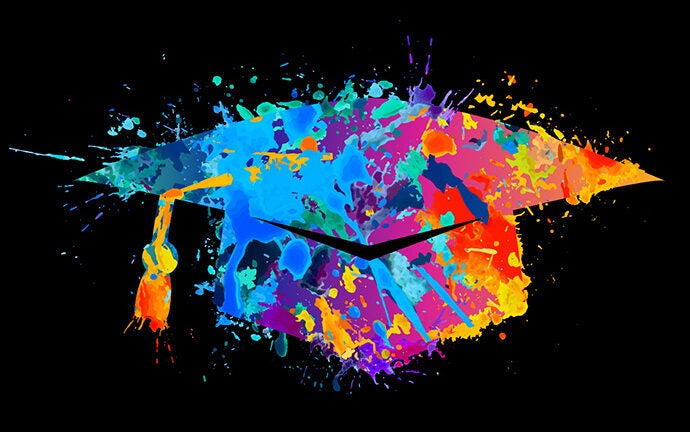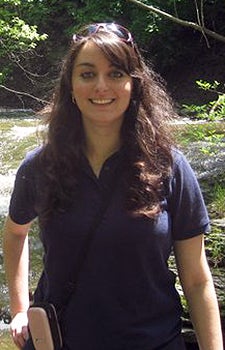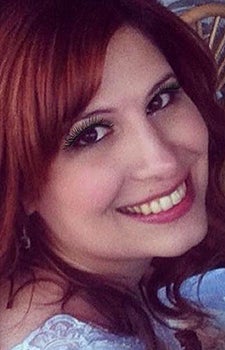
Hooding doctors of poetry and paleontology
Elizabeth Petsios: Appreciating Disaster

Liz Petsios traveled frequently to collect rock samples for her doctoral research on ecosystems after a mass extinction. Photo courtesy of Liz Petsios.
Elizabeth (Liz) Petsios has spent years studying one of the most important events in Earth’s history — and she’ll soon achieve a major milestone in her own life because of those efforts.
Petsios will walk at USC Dornsife’s Hooding Ceremony on May 12 and is expected to earn her doctorate in early August. The degree is a result of her research into the aftermath of mass extinction.
“I study the Permian-Triassic extinction, which happened about 250 million years ago and was the largest mass extinction that we know of,” she said. “After that, the world’s ecosystems were in complete disarray because so many species disappeared, so I look at how ecosystems recovered and how quickly.”
More specifically, she studies “disaster species” — animals such as snails and clams that use catastrophes as an opportunity to proliferate and become even more abundant.
“We will probably have something that qualifies as a disaster species relatively soon given global climate change,” she said. “But until we experience a mass extinction, we won’t have anything exactly the same as what we observe from 250 million years ago.”
Petsios enjoys describing her research because its implications are far-reaching and because even non-paleontologists appreciate its importance.
“If we better understand how ecosystems respond to and recover from major crises in the past, we will have a better understanding of how they will cope in the future,” she said. “We are currently going through something similar to what happened 250 million years ago — with oceans warming and increased atmospheric carbon dioxide.
“The bottom line is that it could take millions of years to recover,” she said.
Petsios, who earned her B.S. from Cornell University, is excited to begin a postdoctoral position at USC and hopes one day to obtain a full-time faculty position in academe.
Citing her adviser David Bottjer, professor of earth sciences, biological sciences and environmental studies, as hugely influential to her success, Petsios said she strives to be as strong a teacher as she is a scholar.
“Last year for the first time I mentored a student in research,” she recalled. “I realized that I have to be patient because students won’t know everything I do, and I had to learn how to explain things clearly and thoroughly.”
While it sometimes takes just a gentle touch to get a student motivated, “it often requires a less-subtle approach to get a student on track,” she said. “I learned that it takes work to be a good adviser.”
Throughout her five years at USC, Petsios traveled frequently to collect rock samples for her research. The sea level was higher during the time period she studies, so many places that are now entirely landlocked include prime fossils of marine species from that time.
“I traveled to Montana, Italy and Hungary to collect samples, and to Germany and Austria to see fossils in museums and in personal collections,” she said.
Petsios also attended a field trip in China in 2013.
“That was so interesting because even though the rocks were from the same time period, they were dramatically different from the rocks you see here,” she said.
In addition to having one of the highest-ranked paleontology programs in the country, USC is unique in that the group of scholars and students is extremely cohesive, Petsios explained.
“If you ever need a field assistant, people are willing to come and help you,” she said. “They may not understand what the fossils are about — because they work on volcanoes — but they’ll come to Montana and help you carry them down a mountain.”
Faculty members in USC Dornsife’s Department of Earth Sciences also strongly encourage students to venture out into the field and collect their own samples.
“Seeing the fossils in their natural environments gives you a better idea of what that ecosystem was like as opposed to looking at already-processed rocks,” she said. “I think it also makes us more passionate about our research — because we’ve hiked long distances to find our samples in cold or windy conditions. It puts it all in context.”
Fox Frazier-Foley: Ecstatic Poetess

Fox Frazier-Foley is a published and award-winning poet whose works reflect her deep sense of spirituality. Photo courtesy of Fox Frazier-Foley.
Poet and Provost’s Fellow Fox Frazier-Foley believes one of the most important pieces of advice she received from her adviser, David St. John, University Professor of English and Comparative Literature, was to “go where the heat is.”
“He told me to go to the places I felt drawn to and where I felt energy,” recalled Frazier-Foley, who will receive her Ph.D. in creative writing and literature. “He said that while there may be influences that try to steer me toward other areas of focus, this was my time to disregard them.”
Frazier-Foley heeded St. John’s counsel, especially during her fellowship year from 2012-13, which she spent writing in New York City and upstate New York.
“During that time, I most definitely had doubts and asked myself, ‘What if I spend all this time trying to do something I don’t know how to do yet, and it ends up being a failed exercise? What then?’” she recalled.
But Frazier-Foley fought the urge to follow the safer, more prescriptive path, and her mentor’s strategy worked.
During her time at USC, Frazier-Foley published two prize-winning poetry collections, Exodus in X Minor (Sundress Publications, 2014) and The Hydromantic Histories (Bright Hill Press, 2015). She also recently edited an anthology of contemporary American political poetry titled Political Punch(Sundress Publications, 2016), which was released in March. She is currently editing Among Margins, a collection of critical writing on aesthetics (Ricochet Editions, 2016), due to be released in July.
Going forward, Frazier-Foley will continue to run a small literary press called Agape Editions, an imprint of Sundress Publications.
“We are dedicated to publishing literary works that reflect inter-faith or inter-cultural themes,” she said. “We especially look for moments of spirituality or ecstasy. We want to produce a catalog that shows the potential of religious practice to be a conduit for cultural identity.”
Frazier-Foley’s own poetry is influenced deeply by her spirituality, her fascination with mythology and her own practice of the Vodou religion.
“My family is very diverse,” she said, “and I think that was generally a big influence on me.”
A true poet, Frazier-Foley describes her connection to spirituality in metaphorical terms.
“I think of it as a bicycle wheel with the numinous, or the divine entity, in the middle and every religious path as a spoke going from the outside — our everyday lives — into the center.”
Her poem “St. Gemini is Possessed by Silibo Nouvavou, St. Revelation, and Begins to Breathe Psalm 42:7” — which she described as “capturing the ecstasy of being part of a religious experience” — won USC’s Edward W. Moses Graduate Prize in Creative Writing in 2014.
Frazier-Foley is a founder and managing editor of USC Dornsife’s literary press Ricochet Editions, editor-curator of The Poetry Blog’s Infoxicated Corner and creator of poetry horoscopes for Luna Luna magazine.
In January 2015, The Hylander Diner, a blog that features indie writers, interviewed Frazier-Foley. The author asked her what it felt like when she learned her first book would be published.
Frazier-Foley, who at the time was looking into other career options — such as medicine — responded that it was “like a message from God not to give up.”
Though she now feels her response sounds “slightly grandiose,” Frazier-Foley stands by the fact that getting published infused her with a renewed sense of confidence and purpose.
“I do remember it feeling like a divine message,” she said. “And I was so grateful that I hadn’t given up earlier.”